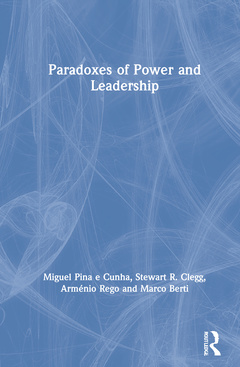Description
Paradoxes of Power and Leadership
Language: English
Subjects for Paradoxes of Power and Leadership:
Keywords
Creative Commons Attribution Share Alike; paradox; Kets De Vries; leadership skills; Corona Virus; leadership styles; Vice Versa; leadership contradictions; Paradoxical Wisdom; leadership paradoxes; Pragmatic Paradoxes; organizational leadership; Andrew Hill; organizational paradoxes; Ceo; critical paradoxical leadership skills; Employee Organization Relationships; leadership behaviour; Powerful Ceo; paradoxical leader behaviors; De Rond; Business equilibrium; Manfred Kets De Vries; Leadership behaviours; AOM; Organizational problems; Jacinda Ardern; Political power; Humble Leader; Traditional management; Ceo Personality; Paradoxical Mindset; Paradox Lens; Sublime Body; Ceo Role; Christchurch City Council; Narcissistic Leaders; Dual Leadership Structure; SDG; Pole Star
Publication date: 05-2021
· 15.6x23.4 cm · Hardback
Publication date: 05-2021
· 15.6x23.4 cm · Paperback
Description
/li>Contents
/li>Readership
/li>Biography
/li>
Why do great companies and other organizations fail, sometimes abruptly? Why do admired leaders fall from their organizational pedestals? Why do young and promising managers derail? Why do organizations create and reinforce rules that manifestly damage both them and those that they employ, serve and sustain? Leadership is a much-discussed but ill-defined idea in business and management circles. Analysing and understanding the skills and behaviours exhibited in leadership practice reveal that leaders exhibit paradoxical activities that challenge our understanding of organizations.
In this text, the authors identify leadership behaviours that compete towards business equilibrium: selfish versus selfless, distance versus proximity, consistency versus individuality, enforcing professional standards versus flexibility and control versus autonomy. These paradoxical dilemmas require a reflexive and analytical approach to a subject that is tricky to define. The book explores the paradoxes of power and leadership not as a panacea for solving organizational problems but as a lens through which leadership and power are seen as an exercise in dynamic balance. Read this book as an invitation to the paradoxes of power and leadership that frame organizational life today. Be prepared to find surprises ? and some counterintuitive arguments.
Providing a thought-provoking guide to the traits and skills that will help readers to understand and navigate paradoxical leadership behaviour, this reflexive book will be a useful reading for students and scholars of business, management and psychology globally.
Introduction 1. Leadership and paradox 2. Paradoxes of self-leadership 3. Paradoxes of dyadic relationships 4. Paradoxes of team dynamics 5. Paradoxes at organizational level 6. Recurring paradoxes and ten lines of action References.
Miguel Pina e Cunha is the Amélia de Mello Foundation Professor of Leadership at the Nova School of Business and Economics, Universidade Nova de Lisboa, Lisbon, Portugal.
Stewart R. Clegg is Professor in Management at the University of Stavanger Business Schoool, Norway, and NOVA School of Business and Economics, Portugal.
Arménio Rego is Professor at Católica Porto Business School, Portugal.
Marco Berti is Senior Lecturer at UTS Business School, University of Technology Sydney, Australia.
These books may interest you

Managing Leadership Paradoxes 160.25 €

Managing Leadership Paradoxes 50.12 €


